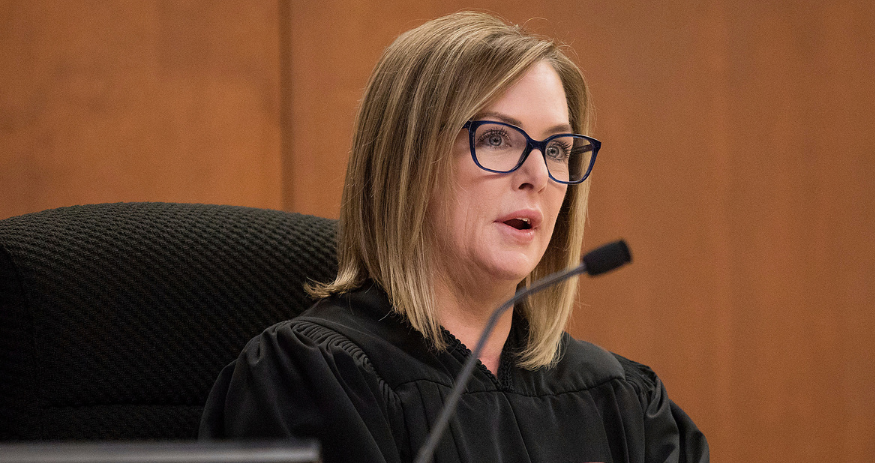Judges face increased scrutiny in upcoming election
Kiera Riley Arizona Capitol Times//September 23, 2024//
Judges face increased scrutiny in upcoming election
Kiera Riley Arizona Capitol Times//September 23, 2024//
Campaign energy in judicial retention elections this cycle has largely concentrated on two state Supreme Court justices, but as voter guides from both sides trickle out, groups have singled out Superior and Court of Appeals judges, too.
Citizen groups lodging voter guides and education efforts on judges up for retention are not entirely new. However, the Republican and Democrat parties started to fold judicial elections into their respective 2024 voting guides, leaving the question of how down-ballot judges will fare come November.
The 2024 retention election stands in contrast to elections past, where voter participation, let alone education or advocacy, on judges up for retention was rare.
After three Superior Court judges were not retained in 2022 after some light advocacy in a voter guide, those working within and around the judiciary predicted the successful effort to see certain judges off the bench would stir new efforts in the next election.
Now, political action committees have launched explicit campaigns for and against the retention of state Supreme Court justices and to educate voters on retention elections in general. Meanwhile, grassroots organizations and political parties have penned Superior and Court of Appeals judges into their voting guides.
“What happened in 2022 motivated people to be more involved in 2024,” said Timothy Berg, co-chair of Arizonans for an Independent Judiciary, a nonpartisan political action committee advocating for the retention of all judges. “This whole judicial retention selection process has become much higher profile than it’s been in the past.”
In 2022, Gavel Watch, an inaugural judicial retention voting guide prepared by Civic Engagement Beyond Voting, advised voters not to retain Justice Bill Montgomery, Maricopa County Superior Court Judges Rusty Crandell, Stephen Hopkins, Howard Sukenic and Bradley Astrowsky, and Court of Appeals Judge Cynthia Bailey.
Voters did not retain Crandell, Hopkins and Sukenic and narrowly kept Justice William Montgomery.
Civic Engagement Beyond Voting issued another installment of Gavel Watch for 2024 and noted at the top of the guide, that the view within the voter guide was “nonpartisan but not neutral,” as the group “with a progressive perspective on governing, judicial standards, citizens’ rights, criminal justice, and rehabilitation.”
The guide was prepared using performance reports from the Commission on Judicial Performance Review, court websites, financial statements, social media and news articles.
Using that information, the group made recommendations to retain, not retain, or retain with reservations.
Beyond warding against retaining state Supreme Court Justices Clint Bolick and Kathryn King, Gavel Watch 2024 advised voters not to retain Maricopa County Superior Court Judge Christopher Coury, Pima County Superior Court Judge Kellie Johnson and Court of Appeals Judge Angela Paton.
The guide noted Coury had ruled against the Invest in Ed initiative, a ballot measure taxing high income households to fund schools, and received more than 20% “poor” and “unacceptable” ratings from litigants and witnesses.
Johnson’s no-vote recommendation is based on her September 2022 ruling lifting an injunction on the 1864 abortion ban after the reversal of Roe v. Wade and finding the all-out ban to take precedence over the 15-week limit passed by the Legislature.
Gavel Watch advised against retaining Paton as her husband, Jonathan Paton, served on the Appellate Court Judicial Nominating Commission at the time of her nomination.
Jonathan Paton told the Arizona Capitol Times he recused himself from his wife’s nomination process and was absent from all relevant meetings.
“As soon as I knew she was going to apply, I did not participate whatsoever,” Paton said.
The guide further points out Paton lobbied on behalf of the Arizona Judges Association to pass Proposition 137, which limits when judges and justices are made to stand for retention, and advises voters to vote against the ballot measure.
Beyond Gavel Watch, Democrat voting guides weighed in on retention beyond the justices, too. The federal and statewide guide for Democratic and independent voters advises against retaining Paton, as well as Court of Appeals Judges Christopher Staring and Brian Furuya, though offers no explanation for advising against retaining the appellate court judges.
The guide makes no mention of Superior Court judges, though some individual legislative district websites noted information on Court of Appeals and Superior Court judges would be coming soon, while others deferred to Gavel Watch.
Republican input on down-ballot judges remains fractured. Some Republican districts advocate for and against Superior and Court of Appeals judges on legislative district voting guides, though the state party has yet to issue its statewide “Golden Ticket.”
Legislative District 11’s guide warns against retaining a long list of Superior Court judges, including Civil Division Judges John Hannah, Timothy Ryan, Christopher Whitten, Scott McCoy and Joseph P. Mikitish, though the guide offers no reason for not retaining the judges. LD2 similarly issued a list of judges fit for retention, with the same civil judges absent.
LD3 advocates for the retention of all judges, but Judge Peter Thompson.
Other Republican voting guides advocate for keeping all judges on the bench, noting that removing any judges would give Democratic Gov. Katie Hobbs an opportunity to appoint replacements.
While grassroots organizations and political parties put out literature for or against various judges, Berg noted Arizonans for an Independent Judiciary advised voters to retain all judges as they all met judicial standards per Judicial Performance Review in their voting guide and hopes to put together a voter education campaign together soon.
“Our position is ‘the system works,’” Berg said. “We’ve got good people. The judicial performance review process works, and you ought to rely on that and information like that, rather than just somebody getting mad at the judge over one case or two cases.”














































